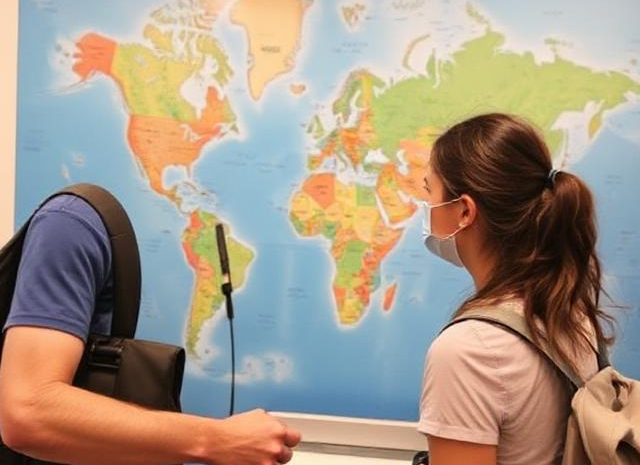
The Importance Of Vaccinations And Health Precautions Before Traveling
When planning to travel, taking the necessary vaccinations and health precautions is crucial to ensure your well-being during the trip and protect you from potential health risks. Travel exposes you to new environments, climates, and diseases that may not be prevalent in your home country, so being proactive about health measures can prevent unnecessary illness and complications. Here’s why vaccinations and health precautions are important before traveling:
1. Protection Against Infectious Diseases
- Preventing Common Travel-Related Illnesses: Some destinations have higher risks of infectious diseases that you may not encounter at home. These can include diseases like malaria, typhoid, cholera, yellow fever, and hepatitis A and B, depending on the region. Getting vaccinated or taking preventative treatments can protect you from contracting these illnesses.
- Immunization for Routine Diseases: Vaccines like measles, mumps, rubella (MMR), tetanus, and influenza are essential, even for travel to developed countries, as the risk of outbreaks can still occur.
- Travel-Specific Vaccines: Certain vaccines may be required or recommended depending on the country you’re visiting. For example, the yellow fever vaccine is required for travel to specific regions of Africa and South America, and the meningitis vaccine may be required when traveling to parts of sub-Saharan Africa.
2. Reducing the Risk of Disease Outbreaks
- Local Outbreaks: Traveling to countries with ongoing outbreaks of diseases like Zika, dengue, or Ebola increases your exposure. Vaccines and preventive measures, like using insect repellent or taking antimalarial drugs, can help reduce the risk of infection.
- Traveling to High-Risk Areas: In some regions, diseases like cholera or hepatitis A are more common, especially if you are in areas with poor sanitation or access to clean water. Vaccines can offer protection, while following health precautions like avoiding street food and drinking bottled water can also help minimize risk.
3. Safety for Vulnerable Populations
- Young Children, Elderly, and Pregnant Women: Certain groups, including young children, the elderly, and pregnant women, may be more vulnerable to illness. Vaccinations and other health precautions (e.g., avoiding certain activities or regions) are particularly important for these travelers to avoid severe health complications.
- Chronic Health Conditions: If you have a pre-existing condition (such as diabetes, asthma, or heart disease), it’s important to speak with your doctor before traveling to make sure you’re prepared for any potential health risks and know what additional precautions to take.
4. Peace of Mind While Traveling
- Preparedness: Knowing that you’ve taken the necessary health precautions can give you peace of mind and reduce the stress of traveling to regions with health risks. When you have the proper vaccinations and medications, you can focus on enjoying your trip rather than worrying about potential health problems.
- Avoiding Unexpected Health Costs: Medical treatment abroad can be expensive, especially if you contract a disease that could have been prevented with a vaccine. Having the right immunizations can save you from costly medical bills and potential travel interruptions due to illness.
5. Compliance with Entry Requirements
- Visa and Immigration Requirements: Some countries require proof of specific vaccinations before granting entry. For example, many countries require proof of the yellow fever vaccination if you’re traveling from an infected region. Not having the required vaccinations can lead to delays, denials of entry, or even being sent back to your home country.
- Health Certificates: Some regions also require a health certificate or proof of vaccination when crossing borders, especially during health crises like pandemics. For example, during the COVID-19 pandemic, many countries mandated proof of a negative test result or vaccination.
6. Traveler’s Health Safety Tips:
- Consult a Travel Health Professional: It’s important to visit a doctor or travel health clinic several weeks before your trip to get any necessary vaccinations and prescriptions. Travel health experts can provide region-specific advice based on your destination.
- Medication for Preventive Care: For some diseases, such as malaria, there are medications that can be taken before, during, and after your trip to reduce your risk. Your doctor can prescribe these as part of your travel health plan.
- Insect Protection: In addition to vaccinations, take steps to protect yourself from insect-borne diseases like malaria, dengue, and Zika. This includes using insect repellent with DEET, wearing long sleeves and pants, and sleeping under a mosquito net if necessary.
- Stay Hydrated and Avoid Food-Related Illness: Drink bottled water and avoid street food, especially in countries where food safety and water sanitation are a concern. This can help prevent illnesses like travelers’ diarrhea.
7. Health Preparations Beyond Vaccines
- Travel Insurance: Comprehensive travel insurance can be invaluable in case you need medical assistance while abroad. Make sure your travel insurance covers medical emergencies and includes coverage for any specific risks associated with your destination.
- First-Aid Kit: Always pack a basic first-aid kit that includes items such as pain relievers, antiseptics, bandages, antidiarrheal medications, and any personal prescriptions. This can help you manage minor health issues while traveling.
- Know the Health Infrastructure: Research the healthcare infrastructure of your destination. In some areas, access to medical care might be limited, and it’s important to know where the nearest medical facility is in case of emergencies.
8. Plan Well in Advance
- Timing: Some vaccinations require multiple doses or need to be administered several weeks before travel to be effective. For example, the hepatitis A vaccine typically requires two doses given over several months. Start planning early to allow enough time for vaccinations to take full effect.
- Keep a Record: Keep a record of your vaccinations and any health documents required for entry into foreign countries. This documentation can be vital in case of emergencies and will help smooth the entry process.

